Legacy and emerging polluntants
From the development of analytical methods to the study of environmental processes
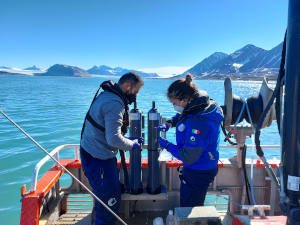 Despite the geographical isolation and limited human presence, polar regions are strongly affected by long-range transport leading to the dispersion of pollutants emitted in low and medium latitudes and on a local scale. Scientific research efforts have allowed the collection of long-term data on the presence of heavy metals and persistent organic contaminants (POPs) in the Arctic; however, there are still no systematic monitoring programs for such compounds in Antarctica.
Despite the geographical isolation and limited human presence, polar regions are strongly affected by long-range transport leading to the dispersion of pollutants emitted in low and medium latitudes and on a local scale. Scientific research efforts have allowed the collection of long-term data on the presence of heavy metals and persistent organic contaminants (POPs) in the Arctic; however, there are still no systematic monitoring programs for such compounds in Antarctica.
More recently, attention has been focused on new classes of contaminants, defined as emerging, because they are not yet included in current regulations. The effects of these compounds on the organisms and environment are still not fully known. The determination of the occurrence of these substances in the environment and the evaluation of their effects on ecosystems is an important scientific challenge, especially considering their different chemical-physical properties and the continuous production of new formulations. Since many emerging contaminants are bioactive molecules with potentially harmful effects on the organisms and environment even at low concentrations, the development of suitable monitoring programs has crucial importance. The Arctic Monitoring and Evaluation Program (AMAP) has indicated that the risk due to the presence of emerging chemical pollutants but also the more investigated persistent organic pollutants (POPs) and mercury at the poles is still very high. Therefore, it is of priority interest to deepen the knowledge of this issue in the polar areas.
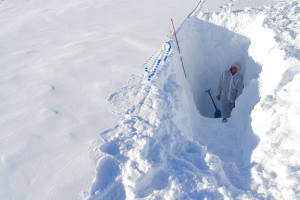 The main research activities concern:
The main research activities concern:
• Optimization, and standardization of analytical methods for the determination of legacy pollutants (e.g. PAHs, PCBs, PBDEs, organo-chlorinated pesticides, etc.), emerging (e.g. pharmaceutical residues, fragrances, perfluorinated compounds, new generation pesticides, etc.) compounds and their metabolites/transformation products. Suspect screening analysis (performed when there is evidence/information that a given structure could be present in the samples) and non-target screening (analysis of all detected components, when no preliminary information is available).
• Development of chemical speciation methods for the identification of biologically active species or species produced by photochemical reactions.
• Continuous and long-term monitoring of organic and inorganic contaminants transported by atmospheric (Gruvebadet - Aerosol laboratory) and oceanic currents (Mooring) via permanent platforms.
• Studies on bioconcentration / biomagnification in the food web (screening assessment); evaluation of antibiotic susceptibility profiles of bacterial strains isolated from water/sediment.
• In-situ and real-time monitoring of organic and inorganic contaminants by using biosensors.
• Development and application of metabolomic analysis in environmental matrices for the study of degradative processes that determine the production of potentially polluting metabolites; this approach makes it possible to identify the presence of unknown pollutants and to relate them to the biological processes taking place in the system.
• Laboratory scale studies (e.g., microcosm and batch) to evaluate biotic and abiotic (chemical and physical) degradation processes (DT50 calculation), formation of metabolites and transformation products, and bioaccumulation in target organisms (vegetable and animal species).
• Optimization, standardization and validation of innovative biotechnologies for the in situ bioremediation and bio-mitigation of environmental matrices impacted by organic and inorganic contaminants.
Main ERC Panels:
• PE4_5 - Analytical chemistry
• PE4_7 - Chemical instrumentation
• PE4_9 - Method development in chemistry
• PE4_18 - Environment Chemistry
• PE10_1 - Atmospheric chemistry, atmospheric composition, air pollution
• PE10_8 - Oceanography (physical, chemical, biological, geological)
• PE10_9 - Biogeochemistry, biogeochemical cycles, environmental chemistry
• PE10_17 - Hydrology, hydrogeology, engineering and environmental geology, water and soil pollution
Micro- and Nano plastics
Plastic Pollution: occurrence, distribution, and impacts on the environment and biota
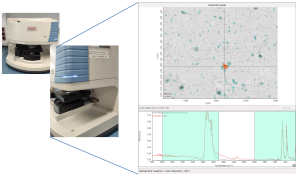 Plastic polymers are ubiquitous and persistent pollutants; they have been observed in different environmental compartments and various taxa and can fragment into smaller particles. We speak of macroplastics (>20 cm), mesoplastics (20 cm - 5 mm), microplastics (5 mm -1 µm), and nanoplastics (<1 µm). Microplastics have been observed in the world's oceans, soils, air, organisms from aquatic insect larvae to fish, and some marine mammals. Plastic particles have been observed at any latitude, from the equator to the North Pole and Antarctica. Their transport pathways can be influenced by bulk density and, most importantly, the size of the polymers. Smaller particles (<100 µm), called small microplastics, can be transported far from the release source. The residence time in the environment not only affects their size because particles can become smaller and smaller through photodegradation, the action of marine and atmospheric currents, but also their bulk density, so that even low-density polymer particles can sink the water column accumulating in sediments. Since there are no standardized methods for analysis, extensive studies are needed to understand the fate and pathways of these particles, which may also play a pivotal role in climate change. Microplastics can act as cloud condensation nuclei and ice nucleating particles, impacting albedo, solar radiation, and ice melt. Microplastics and nanoplastics, through ingestion, can enter the trophic web and reach humans. Small invertebrates such as Arctic amphipods or bivalves (e.g., mussels) can ingest small microplastics, promoting their potential biomagnification along the trophic net to pose a risk to human health as well. Small microplastics and nanoplastics can also be inhaled and, because of their size, can reach organs such as the lungs or brain, causing chronic inflammatory states. The toxicity of micro- and nanoplastics can be related to plastic additives, such as plasticizers, vulcanizers, antioxidants, etc.; some of these compounds can undergo leaching during particle breakup and be released into the environment.
Plastic polymers are ubiquitous and persistent pollutants; they have been observed in different environmental compartments and various taxa and can fragment into smaller particles. We speak of macroplastics (>20 cm), mesoplastics (20 cm - 5 mm), microplastics (5 mm -1 µm), and nanoplastics (<1 µm). Microplastics have been observed in the world's oceans, soils, air, organisms from aquatic insect larvae to fish, and some marine mammals. Plastic particles have been observed at any latitude, from the equator to the North Pole and Antarctica. Their transport pathways can be influenced by bulk density and, most importantly, the size of the polymers. Smaller particles (<100 µm), called small microplastics, can be transported far from the release source. The residence time in the environment not only affects their size because particles can become smaller and smaller through photodegradation, the action of marine and atmospheric currents, but also their bulk density, so that even low-density polymer particles can sink the water column accumulating in sediments. Since there are no standardized methods for analysis, extensive studies are needed to understand the fate and pathways of these particles, which may also play a pivotal role in climate change. Microplastics can act as cloud condensation nuclei and ice nucleating particles, impacting albedo, solar radiation, and ice melt. Microplastics and nanoplastics, through ingestion, can enter the trophic web and reach humans. Small invertebrates such as Arctic amphipods or bivalves (e.g., mussels) can ingest small microplastics, promoting their potential biomagnification along the trophic net to pose a risk to human health as well. Small microplastics and nanoplastics can also be inhaled and, because of their size, can reach organs such as the lungs or brain, causing chronic inflammatory states. The toxicity of micro- and nanoplastics can be related to plastic additives, such as plasticizers, vulcanizers, antioxidants, etc.; some of these compounds can undergo leaching during particle breakup and be released into the environment.
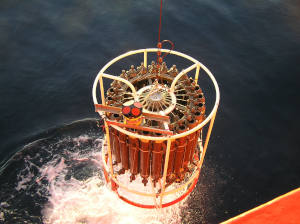
• Development of mild pretreatment methods for the simultaneous extraction of microplastics, particularly small microplastics, and plastic additives from different environmental matrices
• Development of analytical methods (via Micro-FTIR and pyrolysis-GC/MS)
• Simultaneous quantification and characterization of polymers and plastic additives (Micro-FTIR)
• Cross-validation of polymer characterization (pyrolysis-GC/MS)
• Identification of bioindicators
• Qualitative and quantitative analysis of bacterial communities associated with plastic debris and their metabolism in different environmental matrices (water, sediment, snow)
• Identification of stress biomarkers
Main ERC Panels:
• LS8_12 - Microbial ecology and evolution
• LS8_13 - Marine biology and ecology
• PE4_5 - Analytical Chemistry
• PE4_9 - Method development in chemistry
• PE4_17 - Characterization methods of materials
• PE4_18 - Environment Chemistry
• PE10_1 - Atmospheric chemistry, atmospheric composition, air pollution
• PE10_4 - Terrestrial Ecology
• PE10_8 - Oceanography (physical, chemical, biological, geological)
Sources, transport and environmental dynamics
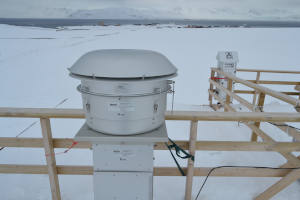 Contaminants can be transported from lower latitudes to Polar Regions through sea currents, atmospheric currents and migratory animals. Certain evidences suggest that long-range atmospheric transport of organic contaminants and metals occurs on a global scale. The detailed mechanism and extent of this phenomenon is poor investigated, as well as the chemical and physical proprieties of the atmospheric aerosols that facilitate this transport to polar environments.
Contaminants can be transported from lower latitudes to Polar Regions through sea currents, atmospheric currents and migratory animals. Certain evidences suggest that long-range atmospheric transport of organic contaminants and metals occurs on a global scale. The detailed mechanism and extent of this phenomenon is poor investigated, as well as the chemical and physical proprieties of the atmospheric aerosols that facilitate this transport to polar environments.
Monitoring data from remote locations was currently used by regulatory agency to assess the potential for long-distance transport of a substance. This evaluation method has limitations, as the collection of monitoring data tends to be a posteriori rather than a priori. Then, a substance can have a harmful effect on the environment before any regulation actions. This Thematic Area focuses on the investigation of sources and diffusion mechanisms of contaminants to model and predict the long-distance transport of existing and new substances even before their manufacture and use. Global warming affects these processes, thereby altering the long-range transport and environmental distribution of contaminants. The melting increase of glaciers and permafrost remobilizes several contaminants previously trapped in the cryosphere. Nowadays, polar areas are becoming a source of pollution on a local scale. In fact, an increase of old contaminants, of which the production was banned many years ago, has been recently observed in these regions.
Furthermore, climate change has favored a greater human presence in these remote areas, with the consequent development of fishing, cruise tourism, commercial activities and the extraction of resources (oil, gas and minerals), and therefore greater contamination on a local and regional scale. A further concern is the absence of appropriate abatement technologies available in water treatment plants. Finally, the presence, persistence and distribution of contaminants are strongly influenced by the peculiar characteristics of these regions, such as extreme seasonal variations of light, low temperatures, short growing seasons and limited availability of nutrients.
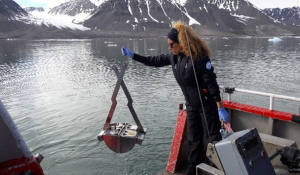 The research activities focus on:
The research activities focus on:
• Study of primary and secondary sources of contamination as well as medium and long-range transport processes of contaminants mainly through the study of atmospheric aerosol also thanks to the (Gruvebadet - Aerosol laboratory).
• Reconstruction of long-term time patterns and human impact in environmental and climate archives, such as ice cores, sediment and permafrost;
• Investigation of the influence of local meteorology on the spatial distribution and temporal trend of contaminants, and how this effect can vary over time;
• Studies on laboratory scale (microcosm and batch) to evaluate the biotic and abiotic degradation processes (DT50 calculation), simulating the real environmental conditions (radiation, temperature, humidity, presence/absence of autochthonous microbial communities).
Main ERC Panels:
• PE4_12 - Chemical reactions: mechanisms, dynamics, kinetics and catalytic reactions,
• PEA4_18 - Environment Chemistry
• PE10_1 - Atmospheric chemistry, atmospheric composition, air pollution
• PE10_3 - Climatology and climate change
• PE10_8 - Oceanography (physical, chemical, biological, geological)
• PE10_9 - Biogeochemistry, biogeochemical cycles, environmental chemistry
• PE10_16 - Ozone, upper atmosphere, ionosphere
• PE10_17 - Hydrology, hydrogeology, engineering and environmental geology, water and soil pollution
• PE10_18 - Cryosphere, dynamics of snow and ice cover, sea ice, permafrosts and ice sheets
• PE10_21 - Earth system modelling and interactions
Noise Pollution
Underwater noise and impact on polar organisms
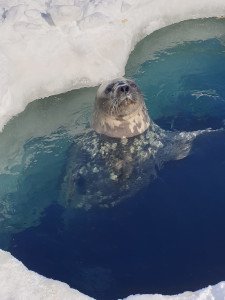 The increasing underwater acoustic noise related to the maritime traffic and the high-intensity sound sources for oil and gas exploration activity represents a considerable impact on marine ecosystems. The impacts of noise on different marine species are increasingly being observed and understood and previously silent areas such as the Arctic are now exposed to noise pollution. Over the last 60 years, in some oceans (i.e. the Pacific ocean), there has been a doubling of noise levels approximately every ten years leaving to suppose that the growth in underwater noise levels is considerably faster in the Polar areas.
The increasing underwater acoustic noise related to the maritime traffic and the high-intensity sound sources for oil and gas exploration activity represents a considerable impact on marine ecosystems. The impacts of noise on different marine species are increasingly being observed and understood and previously silent areas such as the Arctic are now exposed to noise pollution. Over the last 60 years, in some oceans (i.e. the Pacific ocean), there has been a doubling of noise levels approximately every ten years leaving to suppose that the growth in underwater noise levels is considerably faster in the Polar areas. 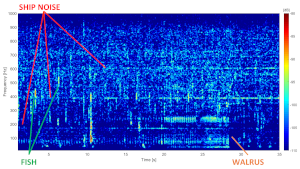 The effects of increased diffuse noise are widely documented for several terrestrial and marine species affected by increased stress levels, physiological weakening and difficulties in intra- and inter-specific acoustic communications, with alterations in energy expenditure and decreased immune responses. Similar effects have already been observed at all levels of the marine food chain and in particular in numerous species of marine mammals, crustaceans, molluscs and fish. However, the evaluation of the effects of diffuse noise in the short- and long-term at population, species and ecosystem level, remains complex to define due to the absence of long-term data series on the cumulative effects of noise exposure associated with the physical state, physiology and sensitivity of the animals. In this context, and thanks to the availability of underwater observatories and research infrastructures such as SIOS in the Arctic and eLTER in Antarctica, ISP is working to collect long-term data series in the Polar areas. The researchers involved in this Thematic Area are focused in the PAM (Passive Acoustic Monitoring) data collection and analysis in order to characterize the different acoustic components in these areas, to establish the noise levels in the polar sites and to assess their impact on ecosystems. In the present context, the collection of environmental acoustic data is performed by autonomous underwater recorders operating up to 1000 meters deep and with autonomy of one year.
The effects of increased diffuse noise are widely documented for several terrestrial and marine species affected by increased stress levels, physiological weakening and difficulties in intra- and inter-specific acoustic communications, with alterations in energy expenditure and decreased immune responses. Similar effects have already been observed at all levels of the marine food chain and in particular in numerous species of marine mammals, crustaceans, molluscs and fish. However, the evaluation of the effects of diffuse noise in the short- and long-term at population, species and ecosystem level, remains complex to define due to the absence of long-term data series on the cumulative effects of noise exposure associated with the physical state, physiology and sensitivity of the animals. In this context, and thanks to the availability of underwater observatories and research infrastructures such as SIOS in the Arctic and eLTER in Antarctica, ISP is working to collect long-term data series in the Polar areas. The researchers involved in this Thematic Area are focused in the PAM (Passive Acoustic Monitoring) data collection and analysis in order to characterize the different acoustic components in these areas, to establish the noise levels in the polar sites and to assess their impact on ecosystems. In the present context, the collection of environmental acoustic data is performed by autonomous underwater recorders operating up to 1000 meters deep and with autonomy of one year.
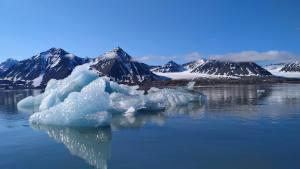 Data collection and analysis aim to:
Data collection and analysis aim to:
• study the underwater soundscape for the spatio-temporal characterization of the biological, geophysical and anthropogenic components and the development of automatic methods for the identification of the acoustic sources in the polar areas;
• define the long-term trends for the assessment of environmental changes and anthropic pressures; - estimate the underwater noise levels on wide spatial and temporal scales;
• define the ecological effects of noise pollution on marine organisms and in particular the evaluation of presence/absence and displacement, seasonal abundance, acoustic behaviour, acoustic biodiversity and the related temporal trends in relation to the different anthropic pressures on populations of marine mammals, fish and crustaceans.
In addition to the PAM data collection in field, studies are carried out in a controlled environment to define the short-, medium- and long-term physiological and behavioural responses of specimens exposed to noise generated by human activities. A fundamental aspect of both field and controlled studies is the development of analysis and tools to predict the alterations and the observable effects at population, species and ecosystem level.
Main ERC Panels:
• LS4_8 - Impact of stress (including environmental stress) on physiology
• LS8_2 - Biodiversity
• LS8_5 - Biological aspects of environmental change, including climate change
• LS8_11 - Behavioural ecology and evolution
• LS8_13 - Marine biology and ecology
Ecosystem responses and adaptations
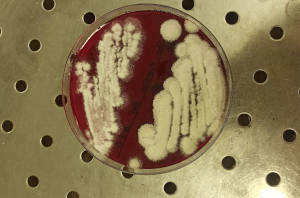 In every environment and in particular in the polar areas, ecosystems tend to maintain specific balances in order to self-perpetuate over time, always tending to a climax state. This condition can fail or be profoundly modified due to disturbances in the ecosystems. Sometimes the perturbations can also be beneficial (e.g. favoring greater biodiversity) but, when they derive by the introduction of pollutants the situation changes considerably. In this context, downstream and/or simultaneously with the investigations and objectives of the section relating to emerging and regulated pollutants and that relating to sources, transport, and environmental dynamics, the lines of research that deal with the effects that these perturbations cause within ecosystems. This area deals with assessing the ecological risk, the responses, and/or adaptations of polar and sub-polar marine and terrestrial ecosystems that may be related to the presence of emerging or regulated pollutants. The investigations focus on the study of the composition and metabolic activity of the microbial communities (cultural, microscopic, biochemical, and molecular investigation techniques, etc.) as well as the effects on the food web due to the presence of pollutants. Finally, a look is directed at the selection of microorganisms that can be used for bioremediation and therefore for the decontamination of environments (in connection with the Thematic Areas Biosciences and Changes in polar systems).
In every environment and in particular in the polar areas, ecosystems tend to maintain specific balances in order to self-perpetuate over time, always tending to a climax state. This condition can fail or be profoundly modified due to disturbances in the ecosystems. Sometimes the perturbations can also be beneficial (e.g. favoring greater biodiversity) but, when they derive by the introduction of pollutants the situation changes considerably. In this context, downstream and/or simultaneously with the investigations and objectives of the section relating to emerging and regulated pollutants and that relating to sources, transport, and environmental dynamics, the lines of research that deal with the effects that these perturbations cause within ecosystems. This area deals with assessing the ecological risk, the responses, and/or adaptations of polar and sub-polar marine and terrestrial ecosystems that may be related to the presence of emerging or regulated pollutants. The investigations focus on the study of the composition and metabolic activity of the microbial communities (cultural, microscopic, biochemical, and molecular investigation techniques, etc.) as well as the effects on the food web due to the presence of pollutants. Finally, a look is directed at the selection of microorganisms that can be used for bioremediation and therefore for the decontamination of environments (in connection with the Thematic Areas Biosciences and Changes in polar systems).
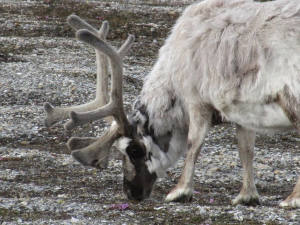 The research activities concern:
The research activities concern:
• analysis of the response of microbial communities to contaminants in terms of abundance, structural, and functional diversity; effect of contaminants on microbial susceptibility profiles to contaminants.
• Search for specific genes related to the microbial populations, responsible for resistance to pollutants, in abiotic matrices and in specific microorganisms.
• Laboratory scale studies (microcosm/mesocosm, batch) to evaluate the effects of selected contaminants on individual microbial strains and autochthonous microbial communities (in terms of structure, function, selection of ARGs, etc.) or target organisms (direct and indirect) representative of the aquatic compartment (e.g. Vibrio fischeri) or terrestrial (e.g. Eisenia fetida).
• Assessment of ecological risk associated with the presence of contaminants and bioaccumulation potential (bioconcentration/biomagnification) in aquatic and terrestrial ecosystems.
• Analysis of the metabolomic pattern of organisms in order to identify the presence of stress in relation to the presence of pollutants or changes in environmental conditions (temperature, salinity, CO2).
Main ERC Panels:
• LS8_1 - Ecosystem and community ecology, macroecology
• LS8_2 - Biodiversity
• LS8_5 - Biological aspects of environmental change, including climate change
• LS8_12 - Microbial ecology and evolution
• LS8_13 - Marine biology and ecology
• LS9_12 - Ecotoxicology, biohazards and biosafety
• PE10_9 - Biogeochemistry, biogeochemical cycles, environmental chemistry
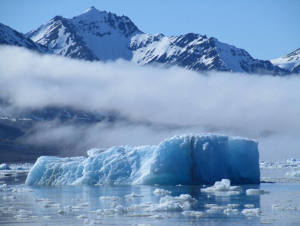 The research activities carried out within the Thematic Area Contaminants and Ecosystems are aimed at studying the sources, transport dynamics, diffusion and fate of regulated and emerging contaminants, including micro/nano-plastics and trace elements, in polar ecosystems. These ecosystems are particularly sensitive to external perturbations, such as human activities and climate change. In fact, the Polar regions constitute the final sink for many pollutants emitted at mid-latitudes and transported on a regional and global scale (long-range) through atmospheric and oceanic circulation and migratory animals: all drivers influenced by the ongoing climate change. Global warming has also favored a growing anthropic impact in the polar areas due to the development of tourist activities, mining and maritime traffic with a consequent increase in the local input of contamination, including noise pollution. The direct and indirect effects of these changes combined with the different dynamics of contamination are causing the fragmentation and destruction of habitats, the alteration of aquatic and terrestrial food webs, as well as loss of diversity with repercussions also on Arctic populations.
The research activities carried out within the Thematic Area Contaminants and Ecosystems are aimed at studying the sources, transport dynamics, diffusion and fate of regulated and emerging contaminants, including micro/nano-plastics and trace elements, in polar ecosystems. These ecosystems are particularly sensitive to external perturbations, such as human activities and climate change. In fact, the Polar regions constitute the final sink for many pollutants emitted at mid-latitudes and transported on a regional and global scale (long-range) through atmospheric and oceanic circulation and migratory animals: all drivers influenced by the ongoing climate change. Global warming has also favored a growing anthropic impact in the polar areas due to the development of tourist activities, mining and maritime traffic with a consequent increase in the local input of contamination, including noise pollution. The direct and indirect effects of these changes combined with the different dynamics of contamination are causing the fragmentation and destruction of habitats, the alteration of aquatic and terrestrial food webs, as well as loss of diversity with repercussions also on Arctic populations. 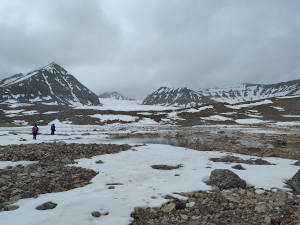 In this context, the multidisciplinary skills that converge in this Thematic Area constitutes an indispensable requirement for understanding the effects due to anthropic impact and climate change in polar ecosystems by following a One Health approach and aiming at a sustainable management of these vulnerable environments in the near future.
In this context, the multidisciplinary skills that converge in this Thematic Area constitutes an indispensable requirement for understanding the effects due to anthropic impact and climate change in polar ecosystems by following a One Health approach and aiming at a sustainable management of these vulnerable environments in the near future.  Despite the geographical isolation and limited human presence, polar regions are strongly affected by long-range transport leading to the dispersion of pollutants emitted in low and medium latitudes and on a local scale. Scientific research efforts have allowed the collection of long-term data on the presence of heavy metals and persistent organic contaminants (POPs) in the Arctic; however, there are still no systematic monitoring programs for such compounds in Antarctica.
Despite the geographical isolation and limited human presence, polar regions are strongly affected by long-range transport leading to the dispersion of pollutants emitted in low and medium latitudes and on a local scale. Scientific research efforts have allowed the collection of long-term data on the presence of heavy metals and persistent organic contaminants (POPs) in the Arctic; however, there are still no systematic monitoring programs for such compounds in Antarctica. The main research activities concern:
The main research activities concern: 


















